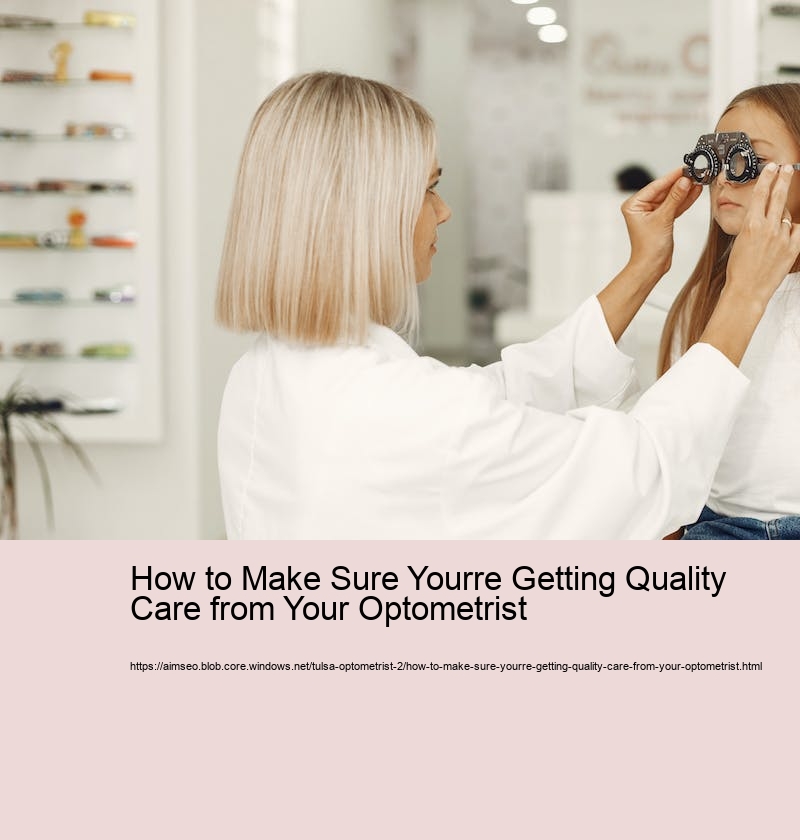How to Make Sure Yourre Getting Quality Care from Your Optometrist
How to Make Sure Yourre Getting Quality Care from Your Optometrist
It's important to make sure you're getting quality care from your optometrist! There are several things (you can do) to ensure this is happening. First, always look for a practitioner with ample experience and qualifications. They should be certified and have a good reputation in the community. Don't hesitate to ask any questions that come to mind or request references from other satisfied patients.
Visit a Tulsa, OK Optometrist Now.
Additionally, it's wise to avoid cut-rate deals when selecting an optometrist. Cheap prices may seem attractive but could end up costing you more down the road if they are not providing top-notch care. It's best to find someone who practices preventive medicine rather than waiting for problems to worsen before addressing them.
Moreover, be sure to bring up any concerns or issues with your optometrist during regular checkups or follow-up visits. You should also take note of any post-treatment instructions given by the doctor and stick with these recommendations until they’re no longer needed! Lastly, don't forget to get yearly eye exams even if your vision has remained stable over time because early detection can help prevent complications in the future.
In conclusion, taking some simple precautions can make all the difference in ensuring you're receiving quality care from your optometrist! By researching their credentials, avoiding discounted services, voicing any worries and following post-treatment instructions – as well as undergoing regular eye exams – you can rest assured that your eyes will remain healthy for years to come!

What is an optometrist?
An optometrist is a healthcare professional who is trained to examine the eyes for visual defects, diagnose problems or impairments, and prescribe corrective lenses or provide other types of treatment.
What is the difference between an optometrist and an ophthalmologist?
While both are eye care professionals, an optometrist provides primary vision care, such as eye exams and vision tests, while an ophthalmologist is a medical doctor specializing in eye and vision care, capable of performing eye surgery.
What does an optician do?
An optician is a professional who designs, verifies and fits eyeglass lenses and frames, contact lenses, and other devices to correct eyesight.
How often should I visit an optometrist?
Generally, it is recommended to have an eye exam every one to two years, depending on your age, risk factors and whether you currently wear corrective lenses.
What is an eye exam?
An eye exam involves a series of tests to evaluate your vision and check for eye diseases. It is performed by an optometrist or an ophthalmologist.
What can I expect during an eye exam?
During an eye exam, you will be tested for visual acuity, eye pressure, and overall eye health. The doctor may dilate your pupils and use a variety of instruments to view your eye's interior.
What are corrective lenses?
Corrective lenses are pieces of glass or plastic prescription by optometrists or ophthalmologists to correct vision impairment such as myopia, hyperopia, astigmatism, or presbyopia.
How do I know if I need glasses?
Signs that you might need glasses include blurry vision, frequent headaches, squinting, difficulty seeing at night, or double vision. An eye doctor can confirm if glasses are needed.
What is myopia and hyperopia?
Myopia (nearsightedness) and hyperopia (farsightedness) are common vision conditions. Myopia makes distant objects appear blurry, while hyperopia makes near objects appear blurry.
What is astigmatism?
Astigmatism is a common vision problem caused by an error in the shape of the cornea. This can cause images to look blurry and stretched out.
What is presbyopia?
Presbyopia is a natural part of the aging process of the eye and is marked by the inability to focus on objects up close. It generally becomes noticeable in the mid to late 40s.
Can children get eye exams?
Yes, children can and should get eye exams. Early detection of vision problems is important for children as it can affect their learning.
Is an optometrist able to perform surgery?
In general, optometrists are not trained to perform surgery. The main exception is laser eye surgery, but even then, only in some regions.
Can an optician prescribe glasses?
No, an optician can't prescribe glasses. They design, fit, and dispense glasses after receiving prescriptions from optometrists or ophthalmologists.
What is an ophthalmologist?
An ophthalmologist is a medical doctor who specializes in eye and vision care. They can diagnose and treat all eye diseases, perform eye surgery and prescribe eyeglasses and contact lenses.
How long does it take to become an optometrist?
Typically, it takes a minimum of seven years of higher education to become an optometrist: a 4-year undergraduate degree and then a 4-year doctorate program in optometry.
What is included in a prescription for glasses?
A prescription for glasses includes the refractive error for each eye, which is given as a numerical value in diopters for nearsightedness or farsightedness and any astigmatism. It may also include pupillary distance.
How does an optometrist test for glaucoma?
Optometrists test for glaucoma through a comprehensive eye exam that includes visual field testing, examining the optic nerve, and testing the pressure inside the eye.
What do the numbers on my eyeglass prescription mean?
The numbers on your eyeglass prescription represent the power of lens needed to correct your vision. SPH corrects nearsighted or farsightedness; CYL and AXIS correct astigmatism; ADD is for bifocal or multifocal lenses.
Can an optometrist detect other diseases?
Yes, optometrists can detect signs of other diseases like diabetes, high blood pressure, or even brain tumors, as they can affect the health of the eyes.